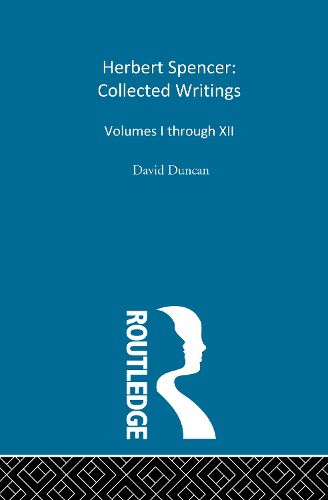Readings Newsletter
Become a Readings Member to make your shopping experience even easier.
Sign in or sign up for free!
You’re not far away from qualifying for FREE standard shipping within Australia
You’ve qualified for FREE standard shipping within Australia
The cart is loading…






Herbert Spencer was regarded by the Victorians as the foremost philosopher of the age, the prophet of evolution at a time when the idea had gripped the popular imagination. His ambition was to construct a ‘Synthetic Philosophy’ which unified all knowledge by demonstrating evolution to be at work throughout the universe from the nebulae to human society. In so doing he made important contributions to biology, psychology, sociology, and philosophy, and his writ ran from the intellectual elite - Darwin called him ‘our great philosopher’ - through the professional classes to the working men whom Beatrice Webb once overheard discussing his ideas on a train. Until recently Spencer’s posthumous reputation rested almost exclusively on his social and political thought, which has itself frequently been subject to serious misrepresentation. But historians of ideas now recognise that an acquaintance with Spencer’s thought is essential for the proper understanding of many aspects of Victorian intellectual life, and the present selection is designed to answer this need. It provides a cross-section of Spencer’s oeuvre from his more popular and approachable essays to a number of the volumes of the Synthetic Philosophy itself. The final volume contains assessments of Spencer made by some of his most influential contemporaries, including: T H Green, William James, Henry Sidgwick, T H Huxley, F W Maitland, and J A Hobson.
$9.00 standard shipping within Australia
FREE standard shipping within Australia for orders over $100.00
Express & International shipping calculated at checkout
Herbert Spencer was regarded by the Victorians as the foremost philosopher of the age, the prophet of evolution at a time when the idea had gripped the popular imagination. His ambition was to construct a ‘Synthetic Philosophy’ which unified all knowledge by demonstrating evolution to be at work throughout the universe from the nebulae to human society. In so doing he made important contributions to biology, psychology, sociology, and philosophy, and his writ ran from the intellectual elite - Darwin called him ‘our great philosopher’ - through the professional classes to the working men whom Beatrice Webb once overheard discussing his ideas on a train. Until recently Spencer’s posthumous reputation rested almost exclusively on his social and political thought, which has itself frequently been subject to serious misrepresentation. But historians of ideas now recognise that an acquaintance with Spencer’s thought is essential for the proper understanding of many aspects of Victorian intellectual life, and the present selection is designed to answer this need. It provides a cross-section of Spencer’s oeuvre from his more popular and approachable essays to a number of the volumes of the Synthetic Philosophy itself. The final volume contains assessments of Spencer made by some of his most influential contemporaries, including: T H Green, William James, Henry Sidgwick, T H Huxley, F W Maitland, and J A Hobson.